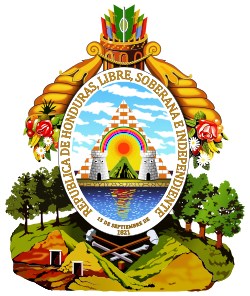| Name | Term | Party | Notes |
|---|
| Carlos Alberto Ucles | 1900–1902 | | |
| Rafael Alvarado Guerrero | 1902–1903 | | |
| Fausto Dávila | 1904–1906 | | |
| Francisco Escobar | 1911–1913 | | |
| Rafael Alvarado Manzano | 1914–1915 | National Party of Honduras | |
| Francisco Escobar | 1915-1918 | | |
| Francisco Bográn | 1919-1920 | | |
| Angel Ugarte | 1921 | Liberal Party of Honduras | |
| Miguel Oqueli Bustillo | 1923 | Liberal Party of Honduras | |
| Ángel Sevilla Ramírez | 1924 | National Party of Honduras | |
| Ramón Alcerro Castro | 1924 | | President of the Constituent Assembly of 1924 |
| Venancio Callejas | 1925–1926 | National Party of Honduras | |
| Tiburcio Carías Andino | 1926–1929 | National Party of Honduras | First Time |
| Antonio C. Rivera | 1929–1930 | National Party of Honduras | First Time |
| Tiburcio Carías Andino | 1930–1931 | National Party of Honduras | Second Time |
| Santiago Meza Cálix | 1931–1932 | Liberal Party of Honduras | |
| Antonio Bográn Mojeron | 1932 | National Party of Honduras | |
| Abraham Williams Calderón | 1932 | National Party of Honduras | |
| Miguel Paz Barahona | 1933–1934 | National Party of Honduras | |
| Ramón Alcerro Castro | 1934–1935 | National Party of Honduras | President of the Constituent Assembly of 1934 |
| Antonio C. Rivera | 1935–1939 | National Party of Honduras | Second Time |
| Plutarco Muñoz P. | 1939–1948 | National Party of Honduras | |
| Luciano Milla Cisneros | 1949 | National Party of Honduras | |
| Juan B. Valladares Rodríguez | 1949 | National Party of Honduras | |
| Jose Máximo Gálvez | 1949–1950 | National Party of Honduras | |
| Camilo Gómez y Gómez | 1950–1954 | National Party of Honduras | |
| Francisco Salomón Jiménez Castro | 1954 | National Party of Honduras | |
| Ramón Villeda Morales | 1957 | Liberal Party of Honduras | President of the Constituent Assembly of 1957 |
| Modesto Rodas Alvarado | 1957–1963 | Liberal Party of Honduras | He was overthrown by the military coup led by Oswaldo López Arellano. |
| Héctor Orlando Gómez Cisneros | 1963 | Liberal Party of Honduras | He assumed the Presidency of the Congress for a few days, after the military coup led by Oswaldo López Arellano |
| Mario E. Rivera López | 1965–1971 | National Party of Honduras | He was President of the National Constituent Assembly of 1965 and the National Congress from 1965 to 1971. |
| Martín Agüero Vega | 1971–1972 | National Party of Honduras | |
| Roberto Suazo Cordova | 1981 | Liberal Party of Honduras | He was the President of the National Constituent Assembly that drew up the 1982 Honduran Constitution. He was then elected President of Honduras in the Honduran general election, 1981 |








